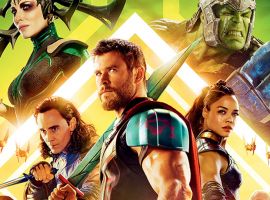
The seventeenth movie of the Marvel Universe debuted an innovative twist on the repetitive and familiar superhero movie. “Thor: Ragnarok” immersed audiences in a self-aware superhero movie that pushed the current generic boundaries, making a playful, comedic shift in the franchise.
Directed by Taika Waititi and written by Eric Pearson, the third sequel in the “Thor” subsection of the Marvel franchise broke records for Marvel and Disney and has raked in over $600 million worldwide at the box office.
Taking place two years after “Avengers: Age of Ultron” (2015), the film starts with Thor (Chris Hemsworth) as he directly addresses the audience and gets us up to speed on the past two years in the Marvel Universe. He continues to explain the entire plot of “Thor: Ragnarok” outright to the audience and alludes to the film’s generic conventions.
Thor has been away from his home for two years, jumping from universe to universe, but eventually he ends up back on his home planet, Asgard, to save it from his evil sister Hela (Cate Blanchett) and the inescapable prophecy, Ragnarok, which would destroy the entire planet. Before he has to save Asgard, Thor must escape the planet Sakaar, where he is an enslaved fighter in the Grandmaster’s (Jeff Goldblum) arena.
The comedy clearly brought me back to the theater to see “Thor: Ragnarok” three times. Critics and audiences alike have credited the creative changes to Thor’s brand to Hollywood outsider Taika Waititi. Director of the mockumentary “What We Do in the Shadows” (2014) and adventure “Hunt for the Wilderpeople” (2016), Waititi is Oscar-acclaimed, but still sits outside of the Hollywood bubble as an “Indie” director from New Zealand. His eccentric style can be seen throughout “Thor: Ragnarok,” but I believe that Thor’s eccentric, comedic change was not only thanks to Waititi, but rather a commercially-motivated shift in Marvel franchise.
The “Thor” franchise has been one of the less successful film lines in the Marvel Universe, starting with “Thor” (2011) and followed by “Thor: The Dark World” (2013), which has the lowest industry ratings of all the Marvel films. It was apparent that the darker, serious “Thor” brand was not resonating with audiences, and the fun, goofy tone of “Guardians of the Galaxy” (2014) has been performing better at the box office.
The original “Guardians of the Galaxy” and “Guardians of the Galaxy Vol. 2” (2017) had a large influence on Thor’s rebranding. The franchise’s hilarious and heartwarming ensemble led by Chris Pratt, iconic 70s-themed soundtrack and spectacular visual effects were a new change to the Marvel Universe. The same ensemble characters, dialogue, and tone from “Guardians” can be seen in “Thor: Ragnarok,” but “Thor” pushes the superhero generic boundaries further.
Each constructed genre has familiar narrative elements or plot structures to which the films considered part of the genre adhere. Within the superhero genre, each narrative includes a superhero with extraordinary qualities that is challenged by a supervillain. The superhero must overcome great obstacles, but ultimately succeeds and saves the world from danger, because, like Thor says, “that’s what heroes do.”
Thor alludes to these conventions in the beginning of the film, saying, “I make grave mistakes all the time and everything seems to work out.” He is aware of his superhero expectation and knows he is performing within a superhero film.
The third “Thor” sequel is innovative in the superhero genre with its heightened awareness and offbeat comedy, but genre innovations to the point of self-aware generic conventions aren’t new. A prominent example is “Scream” (1996), where the characters are openly aware of horror film conventions, which some say revitalized the horror genre. I believe that “Thor: Ragnarok” will have the same resurgence to the superhero genre as “Scream” was to horror.
I loved “Thor: Ragnarok” because it’s self-aware humor kept me laughing throughout the film, Thor’s rebrand epitomizes Marvel’s attempt to keep audiences watching the repeated superhero genre, and they succeeded.
“Thor: Ragnarok” is now in theaters and at Ashley Square Cinema.
